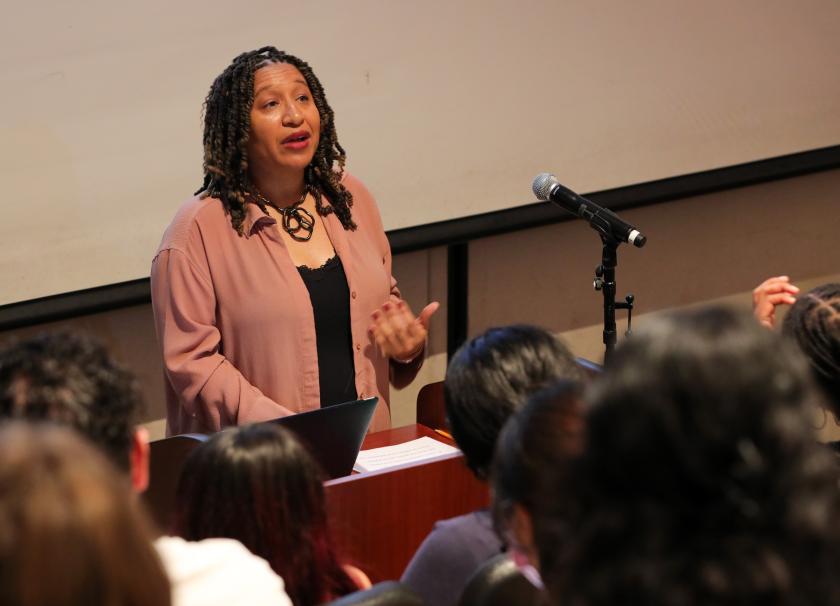October 7, 2022

By Jessica Phan, CSUN Journalism student
Nearly 200 students recently gathered in the University Student Union Theater for CSUN’s 10th annual Banned Books Readout featuring keynote speaker Karimah Tennyson-Marsh, a middle school teacher in Inglewood and an advocate for making challenged books accessible to all.
The action of “banning” books, or rather censoring and regulating the content in books featuring sensitive or controversial topics, is nothing new in the U.S. However, Tennyson-Marsh believes that the current book ban movement is “more insidious” than prior years.
“Books are not only being taken out of schools, but authors, librarians and teachers are being personally harassed and attacked,” she said at the Sept. 29 event that was sponsored by the University Library, Department of Journalism, Queer Studies program and Pride Center.
According to the American Library Association, the total number of books being challenged in the year 2022 will exceed the record set in 2021. Katherine Dabbour, associate dean of the University Library, said that between Jan. 1 and Aug. 31 this year, “The ALA has already documented 681 attempts to restrict library resources representing 1,651 unique titles.”
Tennyson-Marsh narrows the problem down to parents’ lack of trust in children and their teachers. She said some parents feel that if their children are exposed to issues surrounding marginalized groups of people in America, their self-esteem will be affected. In reality, Tennyson-Marsh thinks the opposite will happen, that “(children’s) minds will be open… but only if we trust them with this knowledge.”
As a teacher herself, Tennyson-Marsh has had her fair share of personal experiences with students who identify with marginalized communities such as LGBTQ+ and people of color.
“When books are banned, we are effectively telling students we do not trust their judgment, that only we as adults know what’s right for them,” she said. “If we only allow certain voices to be read in our classroom, then we are telling 50% of our students that they don’t matter.”
In order to build a strong community in her classroom, Tennyson-Marsh makes it her mission to create a safe space for all of her students to learn, share and heal with one another, because the act of reading a novel together “creates a sense of similarity.”
“Banned books give us insight into ourselves and into each other,” she said. “When we don’t allow voices in our classrooms or libraries, we lose the opportunity to grow individually and as a community.”
Fatimah Jackson, a senior journalism student at CSUN, volunteered to read from “Lawn Boy” by Jonathan Evison, one of the most-challenged works of 2021. Before the event, she was not very familiar with the harm of book-banning, but she walked away with a new perspective.
“There are a lot more books being banned than people realize… a lot of information is being censored,” she said. “Until we have people in place that are more understanding and open, a lot of these books are going to continue being pushed off the shelves.”
Elizabeth Blakey, CSUN Associate Professor of Journalism and First Amendment scholar, spoke passionately about how United States is “facing a censorship drive from the thought police.”
Blakey said that classical social theory claims that communities are formed based on sameness and are kept together based on excluding outsiders, but that she disagrees. Prof. Blakey said, "we are a strong community -- bonded together -- because of the beauty in our differences and because of our shared humanity including our differences -- not despite our differences."
Blakey also said, "Let's celebrate our differences and speak back to the thought police who are trying to tell us how to express ourselves."
According to Dabbour, shining light on banned books is “necessary to remind us [of] everyone's right under the First Amendment to free access to information and ideas.”
“It is critically important to continue to educate ourselves [about] how counterproductive banning books is in a democracy,” Dabbour said.
Purchasing challenged books also helps show publishers that there is an audience in search of such books, but Tennyson-Marsh believes that the most important thing anyone can do is participate in local and state elections.
“We can fight this with our vote and bring about change,” she said.
